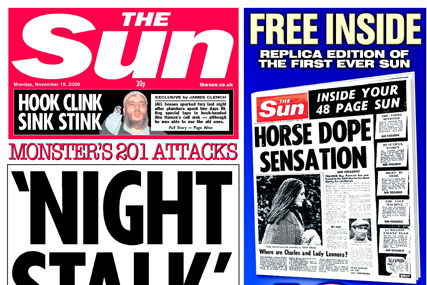NO - Hugo Drayton, chief executive, InSkin Media
Given the traumatic state of the newspaper market, other publishers will wait to gauge the impact and response to News International's initiative before making changes. NI enjoys significant market share, decisive leadership and deep pockets. If retailers accept this change quietly, others will follow.
In London, CTNs (confectioners, tobacconists and newagents) have recently lost London Evening Standard revenue and footfall. In a fast-changing market, this is yet another blow to their viability, especially with no prospect of a surge in sales volume.
Competitors, especially the Mirror and Mail, will step up their trade marketing and point-of-sale activity to exploit a supposed favoured state with the CTNs, but history suggests such a campaign will have limited effect on sales.
At a time when a beleaguered newspaper industry needs all the support possible, with most focused on driving increased revenues from content – while others move to wholly ad-funded models – it is the wrong time to further punish distribution partners.
YES – Liam Mullins, head of press, The7Stars
The answer could well be yes, but we will need to wait and see how retailers in general react to The Sun's move.
It will be difficult for shops to take a hard stand against The Sun, as the product is such a cornerstone brand, bringing shoppers into stores who spend money on other products.
News International is not alone in trying to squeeze costs out of their business, but with more half the circulation going through independents, you have to feel for the little guys – my local shop sells a couple of hundred copies per day, so this could add up to more than £5,000 per year.
We are going to make a stand for the little guy and start demanding a reciprocal 15% discount for our clients.
NO – David Daniel, trade marketing manager, The National Federation of Retail Newagents
We hope other publishers will use The Sun's cash-margin cut as an opportunity to increase their own sales through retailer support, rather than cut their own terms. Most publishers understand that retailers have increasing costs too and, in a progressively declining market, retailers can only keep pace with inflation if publishers keep faith with them by maintaining and progressively improving their margins.
National newspapers still rely on independent newsagents for more than 60% of their daily sales and nearly all of their guaranteed sales that go through home news delivery. It therefore makes no sense commercially to "kill the golden goose" that lays the "golden eggs" that publishers enjoy for breakfast 364 days per year.
The same argument applies to magazines and, whereas supermarkets have high shares of the best-selling titles, both they and the remaining 75% that the large multiples don't stock need independent newsagents as their primary route to market.
YES – Rob Lynam, head of trading, Mediaedge:cia
The Sun accounts for around 31% of all national daily newspapers sold in the UK, contributing approximately £85m each year to retailers, so News International is in a unique position on this matter.
However, if independent retailers show signs of weakness and do not react, it is conceivable other newspapers will follow suit. They will be monitoring the distribution of The Sun over the coming weeks to see what action retailers have taken and, if there has been no impact, the two most likely candidates to respond are the Daily Star and Daily Mail.
With a margin of 12.1p, the Daily Mail will now become the largest contributor of revenue to retailers, estimated at £81m annually – with The Sun's contribution falling to £73m. This is despite the Daily Mail selling a million fewer copies per day.
The Daily Star has been running a sustained cover price promotion at 20p for more than a year now, so may use this an opportunity to reduce its ratio of retail margin to cover price from the current 30%, to be more in line with The Sun and Daily Mirror at around 23-24%.


